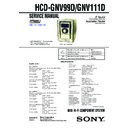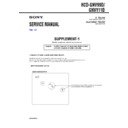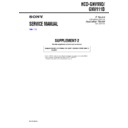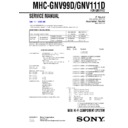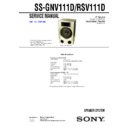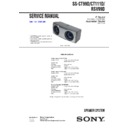Read Sony HCD-GNV111D / HCD-GNV99D / MHC-GNV111D / MHC-GNV99D Service Manual online
HCD-GNV99D/GNV111D
E Model
HCD-GNV99D/GNV111D
Australian Model
HCD-GNV111D
SERVICE MANUAL
MiNi Hi-Fi COMPONENT SYSTEM
Sony Corporation
Home Audio Division
Published by Sony Techno Create Corporation
Published by Sony Techno Create Corporation
9-879-585-05
2006J02-1
© 2006.10
© 2006.10
SPECIFICATIONS
Ver. 1.4 2006.10
– Continued on next page –
• HCD-GNV99D/GNV111D are the Amplifier,
DVD player, tape deck and tuner
section in MHC-GNV99D/GNV111D.
section in MHC-GNV99D/GNV111D.
DVD
Model Name Using Similar Mechanism
NEW
DVD Mechanism Type
CDM74H-DVBU101
Section
Optical Pick-up Name
KHM-310CAB/C2NP
TAPE
Model Name Using Similar Mechanism
NEW
Section
Tape Transport Mechanism Type
CMAT2E2
Photo : HCD-GNV111D
Inputs
VIDEO INPUT:
VIDEO INPUT:
VIDEO: 1 Vp-p, 75 ohms
(phono jacks)
AUDIO L/R: Voltage
250 mV, impedance 47 kilohms
250 mV, impedance 47 kilohms
TV/SAT AUDIO IN L/R: voltage 250 mV/450 mV,
(phono jacks)
(phono jacks)
impedance 47 kilohms
MIC 1/2:
sensitivity 1 mV,
(phone jack)
impedance 10 kilohms
Outputs
AUDIO OUT:
AUDIO OUT:
Voltage 250 mV
(phono jacks)
impedance 1 kilohm
VIDEO OUT:
max. output level 1 Vp-p,
(phono jack)
unbalanced, Sync.
negative load impedance 75 ohms
negative load impedance 75 ohms
COMPONENT VIDEO
OUT:
OUT:
Y: 1 Vp-p, 75 ohms
P
P
B
/C
B
: 0.7 Vp-p, 75 ohms
P
R
/C
R
: 0.7 Vp-p, 75 ohms
S VIDEO OUT:
Y: 1 Vp-p, unbalanced,
(4-pin/mini-DIN jack)
Sync. negative
C: 0.286 Vp-p load impedance 75 ohms
C: 0.286 Vp-p load impedance 75 ohms
PHONES:
accepts headphones of
(stereo mini jack)
8 ohms or more
FRONT SPEAKER:
Use only the supplied speakers
SURR SPEAKER:
Use only the supplied speakers
CENTER SPEAKER:
Use only the supplied speaker
SUBWOOFER OUT:
Voltage 250 mV
(phono jack)
impedance 1 kilohm
Amplifier section
HCD-GNV111D
The following are measured at AC 120, 127, 220, 240V 50/60 Hz
DIN power output (rated)
Front speaker:
DIN power output (rated)
Front speaker:
110 W + 110 W
(6 ohms at 1 kHz, DIN)
(6 ohms at 1 kHz, DIN)
Center speaker:
50 W
(16 ohms at 1 kHz, DIN)
(16 ohms at 1 kHz, DIN)
Surround speaker:
110 W + 110 W
(6 ohms at 1 kHz, DIN)
(6 ohms at 1 kHz, DIN)
Continuous RMS power output (reference)
Front speaker:
Front speaker:
160 W + 160 W
(6 ohms at 1 kHz, 10% THD)
(6 ohms at 1 kHz, 10% THD)
Center speaker:
80 W
(16 ohms at 1 kHz, 10% THD)
(16 ohms at 1 kHz, 10% THD)
Surround speaker:
160 W + 160 W
(6 ohms at 1 kHz, 10% THD)
(6 ohms at 1 kHz, 10% THD)
HCD-GNV99D
The following are measured at AC 120, 127, 220, 240V 50/60 Hz
DIN power output (rated)
Front speaker:
DIN power output (rated)
Front speaker:
130 W + 130 W
(6 ohms at 1 kHz, DIN)
(6 ohms at 1 kHz, DIN)
Center speaker:
30 W
(8 ohms at 1 kHz, DIN)
(8 ohms at 1 kHz, DIN)
Surround speaker:
30 W + 30 W
(8 ohms at 1 kHz, DIN)
(8 ohms at 1 kHz, DIN)
Continuous RMS power output (reference)
Front speaker:
Front speaker:
180 W + 180 W
(6 ohms at 1 kHz, 10% THD)
(6 ohms at 1 kHz, 10% THD)
Center speaker:
50 W
(8 ohms at 1 kHz, 10% THD)
(8 ohms at 1 kHz, 10% THD)
Surround speaker:
50 W + 50 W
(8 ohms at 1 kHz, 10% THD)
(8 ohms at 1 kHz, 10% THD)
2
HCD-GNV99D/GNV111D
Notes on chip component replacement
• Never reuse a disconnected chip component.
• Notice that the minus side of a tantalum capacitor may be
• Notice that the minus side of a tantalum capacitor may be
damaged by heat.
Flexible Circuit Board Repairing
• Keep the temperature of soldering iron around 270˚C
during repairing.
• Do not touch the soldering iron on the same conductor of the
circuit board (within 3 times).
• Be careful not to apply force on the conductor when soldering
or unsoldering.
CAUTION
Use of controls or adjustments or performance of procedures
other than those specified herein may result in hazardous
radiation exposure.
Use of controls or adjustments or performance of procedures
other than those specified herein may result in hazardous
radiation exposure.
This appliance is classified as
a CLASS 1 LASER product.
This label is located on the rear
exterior.
a CLASS 1 LASER product.
This label is located on the rear
exterior.
SAFETY-RELATED COMPONENT WARNING!!
COMPONENTS IDENTIFIED BY MARK 0 OR DOTTED LINE WITH
MARK 0 ON THE SCHEMATIC DIAGRAMS AND IN THE PARTS
LIST ARE CRITICAL TO SAFE OPERATION. REPLACE THESE
COMPONENTS WITH SONY PARTS WHOSE PART NUMBERS
APPEAR AS SHOWN IN THIS MANUAL OR IN SUPPLEMENTS
PUBLISHED BY SONY.
MARK 0 ON THE SCHEMATIC DIAGRAMS AND IN THE PARTS
LIST ARE CRITICAL TO SAFE OPERATION. REPLACE THESE
COMPONENTS WITH SONY PARTS WHOSE PART NUMBERS
APPEAR AS SHOWN IN THIS MANUAL OR IN SUPPLEMENTS
PUBLISHED BY SONY.
Disc player section
System
System
Compact disc and digital audio and video
system
system
Laser
Semiconductor laser
(DVD:
(DVD:
λ = 650 nm, CD: λ = 790 nm)
Emission duration: continuous
Frequency response
DVD (PCM 48 kHz):
2 Hz – 22 kHz (
2 Hz – 22 kHz (
±1dB)
CD: 2 Hz – 20 kHz (
±0.5 dB)
Video color system format
NTSC and PAL
Tape deck section
Recording system
Recording system
4-track 2-channel stereo
Frequency response
50 – 13,000 Hz (
±3 dB), using Sony TYPE I
tape
Tuner section
FM stereo, FM/AM superheterodyne tuner
FM tuner section
Tuning range
FM stereo, FM/AM superheterodyne tuner
FM tuner section
Tuning range
87.5 – 108.0 MHz (50 kHz step)
Antenna
FM lead antenna
Antenna terminals
75 ohms unbalanced
Intermediate frequency
10.7 MHz
AM tuner section
Tuning range
Saudi Arabian model:
Tuning range
Saudi Arabian model:
531– 1,602 kHz
(with the interval set at 9 kHz)
(with the interval set at 9 kHz)
Other models:
531 – 1,602 kHz
(with the interval set at 9 kHz)
530 – 1,710 kHz
(with the interval set at 10 kHz)
(with the interval set at 9 kHz)
530 – 1,710 kHz
(with the interval set at 10 kHz)
Antenna
AM loop antenna
Antenna terminals
External antenna terminal
Intermediate frequency
450 kHz
General
Power requirements
Australian model:
Power requirements
Australian model:
230 – 240 V AC, 50/60 Hz
Mexican model:
127 V AC, 60Hz
Saudi Arabian model:
120 – 127 V, 220 V or
230 – 240 V AC, 50/60 Hz
Adjustable with voltage selector
230 – 240 V AC, 50/60 Hz
Adjustable with voltage selector
Other models:
120 V, 220 V or
230 – 240 V AC, 50/60 Hz
Adjustable with voltage selector
230 – 240 V AC, 50/60 Hz
Adjustable with voltage selector
Power consumption
MHC-GNV111D
MHC-GNV111D
380 W
MHC-GNV99D
285 W
Dimensions (w/h/d) (Approx.)
HCD-GNV111D
HCD-GNV111D
280
× 371 × 398.5 mm
HCD-GNV99D
280
× 360 × 398.5 mm
Mass (Approx.)
HCD-GNV111D
HCD-GNV111D
16.1 kg
HCD-GNV99D
15.2 kg
Design and specifications are subject to change without notice.
Ver. 1.1
3
HCD-GNV99D/GNV111D
1.
SERVICING NOTES
................................................
4
2.
GENERAL
...................................................................
6
3.
DISASSEMBLY
3-1.
Disassembly Flow ...........................................................
8
3-2.
Case .................................................................................
9
3-3.
Loading Panel Assy .........................................................
9
3-4.
Front Panel Assy .............................................................. 10
3-5.
Tuner Pack ....................................................................... 11
3-6.
Tape Mechanism Deck, MIC Board ................................ 12
3-7.
Panel Board, CD-SW Board ............................................ 13
3-8.
DVD Mechanism Deck ................................................... 14
3-9.
Video Board, DMB10 Board ........................................... 15
3-10. Back Panel ....................................................................... 16
3-11. Primary Board ................................................................. 16
3-12. Power Amp PC Board Assy, Main Board ........................ 17
3-13. DVD SURR Board, PA Board ......................................... 17
3-14. Power Transformer (T1200) ............................................ 18
3-15. Driver Board, SW Board ................................................. 18
3-16. DVD Assy ........................................................................ 19
3-17. Optical Pick-up ................................................................ 19
3-18. Sensor Board ................................................................... 20
3-19. Motor (TB) Board ........................................................... 20
3-20. Motor (LD) Board ........................................................... 21
3-11. Primary Board ................................................................. 16
3-12. Power Amp PC Board Assy, Main Board ........................ 17
3-13. DVD SURR Board, PA Board ......................................... 17
3-14. Power Transformer (T1200) ............................................ 18
3-15. Driver Board, SW Board ................................................. 18
3-16. DVD Assy ........................................................................ 19
3-17. Optical Pick-up ................................................................ 19
3-18. Sensor Board ................................................................... 20
3-19. Motor (TB) Board ........................................................... 20
3-20. Motor (LD) Board ........................................................... 21
4.
TEST MODE
............................................................... 22
5.
MECHANICAL ADJUSTMENTS
......................... 27
6.
ELECTRICAL ADJUSTMENTS
.......................... 27
TABLE OF CONTENTS
7.
DIAGRAMS .......................................................... 29
7-1.
Block Diagram – RF Section – ....................................... 30
7-2.
Block Diagram – Video Section – ................................... 31
7-3.
Block Diagram – Tape/Tuner Section – .......................... 32
7-4.
Block Diagram – Main Section – .................................... 33
7-5.
Block Diagram – AMP Section – .................................... 34
7-6.
Block Diagram – Display/Power Section – ..................... 35
7-7.
Printed Wiring Board – DMB10 Board (Side A) – ......... 36
7-8.
Printed Wiring Board – DMB10 Board (Side B) – ........ 37
7-9.
Schematic Diagram – DMB10 Board (1/4) – ................ 38
7-10. Schematic Diagram – DMB10 Board (2/4) – ................ 39
7-11. Schematic Diagram – DMB10 Board (3/4) – ................ 40
7-12. Schematic Diagram – DMB10 Board (4/4) – ................ 41
7-13. Printed Wiring Boards – CD Mechanism Boards – ....... 42
7-14. Schematic Diagram – CD Mechanism Boards – ........... 43
7-15. Printed Wiring Board – Main Board – ............................ 44
7-16. Schematic Diagram – Main Board (1/5) – ..................... 45
7-17. Schematic Diagram – Main Board (2/5) – ..................... 46
7-18. Schematic Diagram – Main Board (3/5) – ..................... 47
7-19. Schematic Diagram – Main Board (4/5) – ..................... 48
7-20. Schematic Diagram – Main Board (5/5) – ..................... 49
7-21. Printed Wiring Board – Panel Board – ............................ 50
7-22. Schematic Diagram – Panel Board – .............................. 51
7-23. Printed Wiring Boards – CD-SW, JOG
7-11. Schematic Diagram – DMB10 Board (3/4) – ................ 40
7-12. Schematic Diagram – DMB10 Board (4/4) – ................ 41
7-13. Printed Wiring Boards – CD Mechanism Boards – ....... 42
7-14. Schematic Diagram – CD Mechanism Boards – ........... 43
7-15. Printed Wiring Board – Main Board – ............................ 44
7-16. Schematic Diagram – Main Board (1/5) – ..................... 45
7-17. Schematic Diagram – Main Board (2/5) – ..................... 46
7-18. Schematic Diagram – Main Board (3/5) – ..................... 47
7-19. Schematic Diagram – Main Board (4/5) – ..................... 48
7-20. Schematic Diagram – Main Board (5/5) – ..................... 49
7-21. Printed Wiring Board – Panel Board – ............................ 50
7-22. Schematic Diagram – Panel Board – .............................. 51
7-23. Printed Wiring Boards – CD-SW, JOG
And MIC Boards – .......................................................... 52
7-24. Schematic Diagram – CD-SW, JOG
And MIC Boards – .......................................................... 53
7-25. Printed Wiring Board – PA Board – ................................ 54
7-26. Schematic Diagram – PA Board – .................................. 55
7-27. Printed Wiring Board – DVD SURR Board – ................. 56
7-28. Schematic Diagram – DVD SURR Board – ................... 57
7-29. Printed Wiring Board – Video Board – ........................... 58
7-30. Schematic Diagram – Video Board – ............................. 59
7-31. Printed Wiring Boards – Trans And Primary Boards – ... 60
7-32. Schematic Diagram – Trans And Primary Boards – ....... 61
7-26. Schematic Diagram – PA Board – .................................. 55
7-27. Printed Wiring Board – DVD SURR Board – ................. 56
7-28. Schematic Diagram – DVD SURR Board – ................... 57
7-29. Printed Wiring Board – Video Board – ........................... 58
7-30. Schematic Diagram – Video Board – ............................. 59
7-31. Printed Wiring Boards – Trans And Primary Boards – ... 60
7-32. Schematic Diagram – Trans And Primary Boards – ....... 61
8.
EXPLODED VIEWS
8-1.
Case, Rear Panel Section ................................................. 73
8-2.
Front Panel Section ......................................................... 74
8-3.
Chassis Section ................................................................ 75
8-4.
DVD Mechanism Section-1 (CDM74H-DVBU101) ...... 76
8-5.
DVD Mechanism Section-2 (CDM74H-DVBU101) ...... 77
9.
ELECTRICAL PARTS LIST
....................... 78
Ver. 1.1
4
HCD-GNV99D/GNV111D
SECTION 1
SERVICING NOTES
NOTES ON HANDLING THE OPTICAL PICK-UP BLOCK
OR BASE UNIT
OR BASE UNIT
The laser diode in the optical pick-up block may suffer electrostatic
break-down because of the potential difference generated by the
charged electrostatic load, etc. on clothing and the human body.
During repair, pay attention to electrostatic break-down and also
use the procedure in the printed matter which is included in the
repair parts.
The flexible board is easily damaged and should be handled with
care.
break-down because of the potential difference generated by the
charged electrostatic load, etc. on clothing and the human body.
During repair, pay attention to electrostatic break-down and also
use the procedure in the printed matter which is included in the
repair parts.
The flexible board is easily damaged and should be handled with
care.
NOTES ON LASER DIODE EMISSION CHECK
The laser beam on this model is concentrated so as to be focused on
the disc reflective surface by the objective lens in the optical pick-
up block. Therefore, when checking the laser diode emission,
observe from more than 30 cm away from the objective lens.
the disc reflective surface by the objective lens in the optical pick-
up block. Therefore, when checking the laser diode emission,
observe from more than 30 cm away from the objective lens.
LASER DIODE AND FOCUS SEARCH OPERATION
CHECK
CHECK
Carry out the “S curve check” in “CD section adjustment” and check
that the S curve waveform is output several times.
that the S curve waveform is output several times.
NOTE ON REPLACEMENT OF DMB10 BOARD
New part of EEPROM (IC103) on the DMB10 board can not be
used. Therefore, if the mounted DMB10 board (A-1099-272-A or
A-1099-344-A or A-1115-347-A) is replaced, exchange new
EEPROM with that used before the replacement.
New part of EEPROM (IC103) on the DMB10 board can not be
used. Therefore, if the mounted DMB10 board (A-1099-272-A or
A-1099-344-A or A-1115-347-A) is replaced, exchange new
EEPROM with that used before the replacement.
UNLEADED SOLDER
Boards requiring use of unleaded solder are printed with the lead-
free mark (LF) indicating the solder contains no lead.
(Caution: Some printed circuit boards may not come printed with
Boards requiring use of unleaded solder are printed with the lead-
free mark (LF) indicating the solder contains no lead.
(Caution: Some printed circuit boards may not come printed with
the lead free mark due to their particular size)
: LEAD FREE MARK
Unleaded solder has the following characteristics.
• Unleaded solder melts at a temperature about 40
°C higher
than ordinary solder.
Ordinary soldering irons can be used but the iron tip has to be
applied to the solder joint for a slightly longer time.
Soldering irons using a temperature regulator should be set to
about 350
Ordinary soldering irons can be used but the iron tip has to be
applied to the solder joint for a slightly longer time.
Soldering irons using a temperature regulator should be set to
about 350
°C.
Caution: The printed pattern (copper foil) may peel away if
the heated tip is applied for too long, so be careful!
the heated tip is applied for too long, so be careful!
• Strong viscosity
Unleaded solder is more viscou-s (sticky, less prone to flow)
than ordinary solder so use caution not to let solder bridges
occur such as on IC pins, etc.
than ordinary solder so use caution not to let solder bridges
occur such as on IC pins, etc.
• Usable with ordinary solder
It is best to use only unleaded solder but unleaded solder may
also be added to ordinary solder.
also be added to ordinary solder.
When the self-diagnosis function is activated to
prevent the system from malfunctioning, a 5-
character service number (e.g., C 13 50) with a
combination of a letter and 4 digits appears in
the on-screen display and the front panel
prevent the system from malfunctioning, a 5-
character service number (e.g., C 13 50) with a
combination of a letter and 4 digits appears in
the on-screen display and the front panel
Self-diagnosis Function
(When letters/numbers appear in the
display)
display)
First 3
characters of
the service
number
characters of
the service
number
Cause and/or corrective action
C 13
The disc is dirty.
• Clean the disc with a soft cloth
(page xx).
C 31
The disc is not inserted correctly.
• Restart the system, then re-insert
the disc correctly.
E XX
(xx is a number)
To prevent a malfunction, the
system has performed the self-
diagnosis function.
system has performed the self-
diagnosis function.
• Contact your nearest Sony
dealer or local authorized Sony
service facility and give the 5-
character service number.
service facility and give the 5-
character service number.
Example: E 61 10
display. In this case, check the following table.
• MODEL IDENTIFICATION
– Back Panel –
– Back Panel –
PART No.
MODEL
PART No.
GNV99D : E3, E15 models
2-584-723-0[]
GNV111D : E2 model
2-584-724-0[]
GNV99D : EA model
2-596-940-0[]
GNV99D : PH model
2-596-941-0[]
GNV111D : MY, SP models
2-596-943-0[]
GNV111D : EA model
2-596-944-0[]
GNV111D : E3, E15 models
2-596-945-0[]
GNV111D : AUS model
2-596-946-0[]
GNV111D : PH model
2-596-947-0[]

